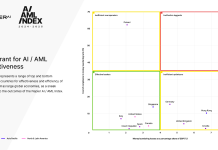The battle against financial crime is ongoing and complex, with Know Your Customer (KYC) protocols at the forefront of safeguarding compliance and securing business operations. As both regulations and customer expectations evolve, entities across various sectors are continually adapting to meet these demands effectively. An effective KYC checklist is central to these efforts, aimed at mitigating risks associated with financial crimes.
FullCircl, a leading identity verification platform, recently delved into the role of KYC in the prevention of financial crime.
KYC, along with Anti-Money Laundering (AML) measures, is vital for the integrity of financial systems. These frameworks help ensure that institutions abide by regulatory guidelines while providing security for both their operations and their clients. Statistics from the National Crime Agency highlight that fraud represents over 40% of crime in the UK, summing up to approximately 3.5m incidents annually. Furthermore, the United Nations Office on Drugs and Crime reports that 3% to 5% of the global GDP is laundered every year, underlining the critical need for robust KYC and AML systems.
At its core, KYC involves verifying customer identities and assessing potential risks related to money laundering and financial crimes. Effective KYC practices are not just about fulfilling regulatory obligations but also about deterring potential fraudsters, who are less likely to target businesses with stringent KYC procedures.
In the UK, the Financial Conduct Authority (FCA) is instrumental in shaping the regulatory landscape for financial crime prevention. Adherence to KYC norms here involves comprehensive identity checks at account openings and meticulous customer due diligence (CDD). Globally, bodies like the Financial Action Task Force (FATF) and regional regulations such as the EU’s Anti-Money Laundering Directives and the US’s Bank Secrecy Act further underscore the international resolve against financial crime.
KYC procedures encompass several stages, starting with the Customer Identification Program (CIP), which collects vital client information, FullCircl explained. This is followed by CDD, where the data is scrutinized for any risk associated with the customer. Technological advancements have enabled the automation of these processes, enhancing efficiency and accuracy in real-time risk assessment.
For ongoing security, KYC demands continuous monitoring of clients to promptly detect and respond to any emergent risks. This proactive approach is essential in maintaining the security integrity of financial institutions.
To further bolster KYC effectiveness, regular training for compliance teams, the adoption of advanced KYC technologies, and enhanced due diligence for high-risk customers are recommended. These practices ensure that financial institutions not only comply with current regulations but are also prepared for emerging threats.
Looking ahead, the integration of AI and blockchain could revolutionize KYC practices by offering more robust, transparent, and efficient solutions. These technologies promise to enhance the security frameworks of businesses, adapting to the increasing sophistication of financial crimes and the evolving regulatory landscape.
In conclusion, KYC remains a cornerstone in the architecture of financial crime prevention. As criminals employ more advanced techniques, the continued evolution and stringent application of KYC protocols are imperative for securing the financial sector and protecting global economic integrity.
FullCircl boasts a suite of KYC, AML, financial crime prevention and document verification software and is trusted by over 700 clients.
Read the full story here.
Keep up with all the latest FinTech news here
Copyright © 2024 FinTech Global
Copyright © 2018 RegTech Analyst






